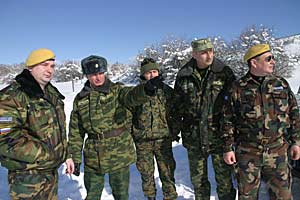
Kazakhstan Building a Legacy in its Chairmanship of the OSCE
Publication: Eurasia Daily Monitor Volume: 7 Issue: 146
By:

Kazakhstan’s OSCE chairmanship has passed its mid-point and is working against the clock to prepare the summit in Astana, which will exceptionally be held well before the year’s end. The issue of Kazakhstan’s legacy in chairing the OSCE has suddenly gained urgency; following the 56 participant countries’ belated decision on July 17 to hold a summit in Astana.
The fact that Kazakhstan is working proactively to build a positive legacy within the limited means at its disposal is itself a semi-success at this stage, at least in terms of motivation. All chairmanships of the OSCE since 2002 (Portugal’s) have failed to deliver results or ameliorate chronic problems, being defeated by Russia’s veto power and the organization’s inherent weaknesses. If Romania’s 2001 chairmanship was the last successful one, the Dutch 2003 chairmanship (with massive national resources at its disposal) was the last ambitious one; the fall it took was all the harder. With those experiences, and facing a resurgent Russia, subsequent chairmanships were content with the symbolic honor, basically aiming to run the clock on the 12-month term and exit smoothly. The Finnish chairmanship did rise to the occasion in August 2008 in Georgia, but had to share in the defeat, as did the OSCE as such.
None of those chairmanships seemed preoccupied with establishing a distinct, positive legacy for the OSCE in their wake. Kazakhstan, however, seems resolute to make a positive difference. Its legacy-building focuses unsurprisingly on its own region, with three components emerging: first, bringing Central Asia into the spotlight, securing an OSCE summit after 11 years without summits, and making the region’s challenges to the OSCE’s center-stage for the first time. Second, coordinating an international response to the Kyrgyz crisis. Finally, seeking to create a role for the OSCE in Afghanistan on selected aspects of soft security and civilian affairs.
The civil violence in Kyrgyzstan in June could have triggered a Russian armed intervention under the colors of Collective Security Treaty Organization (CSTO) (in which Kazakhstan is a member). On June 12, Kyrgyzstan’s interim leader, Roza Otunbayeva, took the desperate step of requesting such an intervention (she recanted afterward). For several days in Washington, some editorialists and pundits rushed to call for a Russian/CSTO intervention. On June 14, however, Kazakhstan’s presidential adviser on foreign policy, Yermurat Yertysbayev, undoubtedly authorized by President, Nursultan Nazarbayev, came out publicly against such an intervention (Interfax, June 14; EDM, June 15), before Moscow itself desisted from that idea. The proposed intervention would have cast Russia as order-keeper of first resort in former Soviet-ruled territories, on top of Russia’s de facto “peacekeeping” monopoly, among the building blocks of a sphere of influence.
Instead, Kazakhstan acted from the OSCE’s chair to promote dispatching a multinational police mission under an OSCE mandate to southern Kyrgyzstan. The Kazakh chairmanship moved proactively to coordinate the drafting of the mission’s parameters and modalities, finally approved by the OSCE’s Permanent Council in Vienna on July 22 (OSCE press releases, July 23).
In Afghanistan, the Kazakh chairmanship proposes to involve the OSCE in activities consistent with the organization’s mandate, and developing its niche competencies. Kazakhstan’s proposals include training officers from the Afghan anti-drug police, border guards, and customs services, using instructors from OSCE participating states, with mostly European funding. Kazakhstan also proposes tasking the OSCE’s Office for Democratic Institutions and Human Rights (ODIHR) to contribute to the reform of Afghanistan’s electoral system through legal recommendations and training of Afghan experts on elections. To coordinate such activities, Kazakhstan proposes to appoint a special representative of the OSCE’s chairmanship for Afghanistan (there is ample precedent for appointing temporary special representatives of the OSCE for conflict-torn areas). Kazakhstan wants these proposals to add substance to the Astana summit (“Efforts to Intensify Cooperation with Afghanistan,” Kazakh Chairmanship Paper, July 7).
Kazakhstan’s Foreign Minister, Kanat Saudabayev, reaffirmed these proposals at the July 16-17 informal ministerial meeting in Astana (which resolved to hold the summit) as well as to the July 20 international donors’ conference in Kabul (press release, July 20). Kazakhstan favors an OSCE presence on the ground in Afghanistan to administer the proposed programs; but is prepared to discuss organizing them partly outside Afghanistan’s territory, if Russia so insists. Indeed, Moscow seeks to minimize any OSCE role with regard to Afghanistan and to prevent the organization from establishing a presence in that country.
On July 1, Russia informed the OSCE’s Permanent Council in session in Vienna: “Referring to border, customs, and anti-drug projects to assist Afghanistan….we cannot support the ideas of the OSCE operating on Afghanistan’s territory, nor can we support attempts to extend human rights and democracy obligations to this country. Nor do we see any grounds for creating the post of OSCE chairmanship’s special representative for Afghanistan” (ITAR-TASS, July 1).
Russia wants to confer such functions to the CSTO under its own leadership; and regards the OSCE as a competitor to the CSTO in this regard. Moscow seeks some form of de facto recognition of the CSTO at the Astana summit; for example, by asking the Kazakh chairmanship to support a meeting where NATO countries and CSTO countries appear as co-equal groups alongside each other for the first time and even subscribe to some joint statement. The Kazakh chairmanship will face a test in that situation. It can pass that test successfully if NATO does not blink first. This, too, will become part of the Kazakh chairmanship’s legacy to the OSCE.




